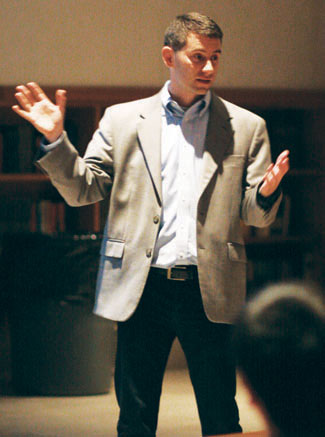IMB Senior Managing Consultant and US Army Reserve Captain Bill Kirst no longer had to hide his personal identity behind his military uniform a year ago today. On that day, September 20, 2011, he celebrated his sexual orientation. The “Don’t Ask, Don’t Tell” policy was officially repealed.
Kirst, who began his military career in 2002, spoke Wednesday evening in the Goodrich Room of the Lilly Library. Kirst’s talk detailed his dual life as a once closeted gay military man and an out-of-the-closet worker for IBM.
The “Don’t Ask, Don’t Tell” policy prohibited discrimination against closet homosexuals and bisexuals in the military. The policy also required closet homosexuals to conceal their sexual orientation.
Kirst struggled between his identity as an IBMer and a military member.
 “I was spending most of my days working for a company like IBM, which was winning awards for diversity,” Kirst said. “Then, I would put on the uniform and go serve on the weekends, and I would have to lie. People would ask me why I was not married, and I would tell them that I was waiting for my military obligations to be over.”
“I was spending most of my days working for a company like IBM, which was winning awards for diversity,” Kirst said. “Then, I would put on the uniform and go serve on the weekends, and I would have to lie. People would ask me why I was not married, and I would tell them that I was waiting for my military obligations to be over.”
Kirst found himself having to falsify his own life.
“I came up with every omission and white lie you could possibly think of,” he said. “The bad thing is it got easy. I became really good at it. It became a talent I was never proud of, but I had to do it because it was part of the law.”
Life became more complex for him when his two professions operated in the same location. His job with IBM required him to work in the Pentagon in 2009.
“My client at the time was the Air Force,” Kirst said. “I spent every single day in the Pentagon with people in uniform as an IBMer. I knew as an IBMer that I could be out and proud, but as I was working with people in uniforms - that I worked with in the other capacity - it was extremely tricky for me. I had to walk this line and say I cannot be out, because if I was out to a colleague, that was fine. But, if a client found out about it, I did not know what they were going to do with that information.”
Kirst first came out of the closet at IBM by registering as LGBT (Lesbian, Gay, Bisexual, Transgendered). Then, he notified his managers about his sexuality through an e-mail.
“IBM strongly supports diversity,” Kirst said. “They want people for how they work and how they contribute. Registering as LGBT was my first click and my first step towards coming out of the closet.”
The Berlin Wall was a metaphor for Kirst’s mental state as a closeted gay man.
“Imagine an emotional Berlin Wall that you have been keeping up for years and imagine holding your arm all the way out to keep people away. Eventually your arm is going to get tired,” Kirst said. “But once you take your arm down, people are going to get closer. I upheld my emotional Berlin Wall for a long time.”
Kirst’s friends noticed that he had built this “Wall” and were concerned.
“There were so many people close to me that I could not let in,” Kirst said. “So, finally, I sent out an email to a lot of people, people who were chipping away at that Wall. They wanted to understand.”
Kirst used social media to come out of the closet publicly after the “Don’t Ask, Don’t Tell” policy was repealed on September 20, 2011. On his Facebook account, he posted a photo of a text message his cousin sent him that said, ‘be proud to be who you are today. I support u!’ He also thanked bands like Paramore for indirectly helping him through his struggles. Furthermore, he blogs about homosexuality and helps his followers with problems they have.
His cousin’s support was encouraging. Kirst is the oldest son of six children from a family with a strong Irish Catholic background. His youngest brother came out of the closet before he did.
“My brother came out of the closet in college,” Kirst said. “My parents’ response scared me and made me go deeper into the closet. It was difficult with my parents at first when I came out, but we worked at it. We are still working at it. It takes time.”
Time eventually passes, however. Time has been a defining characteristic of Kirst’s life. With time, we can become stronger about our diversity.
Kirst will join Rob Shook ’83 for a Chapel Talk Thursday morning. The two are facilitating a workshop Thursday evening on campus focusing on diversity.